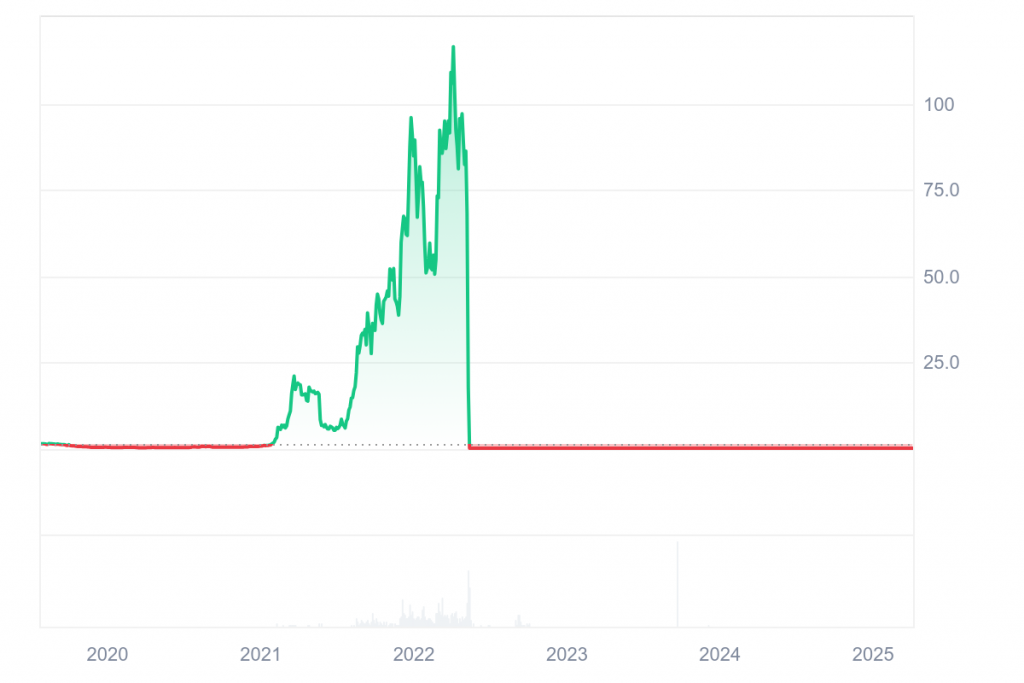Tiempo de lectura: 4 minutos
Terra Luna es sin duda uno de los proyectos más conocidos del ecosistema cripto. Muchos lo conocen por su gran utilidad, y otros, tal vez, por su polémica historia. Terra Luna nace en 2018 cuando Daniel Shin y Do Kwon fundaron este proyecto. Su objetivo era crear una economía digital basada en stablecoins y smart contracts.
El proyecto fue todo un éxito gracias a su sistema de doble token; LUNA, que actuaba como colateral, y TerraUSD, una stablecoin algorítmica. Sin embargo, este sistema fue la causa del declive del proyecto. En mayo del año 2022 el ecosistema sufrió un colapso debido a que UST perdió su paridad con el dólar, lo que llevó a una hiperinflación de LUNA. El colapso fue tan grande que la única solución fue la creación de Terra 2.0, mientras que la cadena original fue renombrada como Terra Classic.

A día de hoy Luna Classic sigue operando en el ecosistema cripto. Tras el colapso se han implementado mejoras en aspectos como gobernanza y seguridad con el objetivo de evitar un segundo crash. El proyecto destaca por permitir envíos, compras y swaps de criptos al instante y sin costes. A simple vista tiene mucho que ofrecer, pero veamos qué pasó exactamente con el proyecto original y qué desencadenó este suceso.
Terraform Labs Creditors: The Crypto Loss Claims Portal is scheduled to open for submission of Crypto Loss Claims on March 31, 2025. Creditors may file Eligible Crypto Loss Claims at https://t.co/7YQvfQr76x. The deadline to file is April 30, 2025 at 11:59 p.m. (prevailing Eastern…
— Terra
Powered by LUNA
(@terra_money) March 28, 2025
¿Qué pasó con Terra Luna?
Como hemos mencionado anteriormente, en mayo de 2022 tuvo lugar el desastre… La stablecoin algorítmica UST pierde totalmente su vinculación al dólar y cae a unos mínimos de hasta USD 0.30. La reacción fue una venta masiva que obligó a quemar una gran cantidad de LUNA para intentar mantener la paridad con la moneda, pero fue inútil. El resultado fue la hiperinflación de LUNA desplomándose más de un 98% en menos de 48 horas.
Sobra decir que este colapso produjo pérdidas masivas para muchos usuarios e inversores. Se perdió la confianza en el proyecto y si aún quedaban usuarios conservando sus criptomonedas, en los siguientes días dejaron de hacerlo. Paralelamente, muchos fondos de inversión también se vieron afectados. Entre ellos, Three Arrows Capital y Celsius Network.
Como seguramente ya sabes, siempre que hay un evento de este calibre, todo el mercado cripto se ve afectado, ya sea para bien o para mal. En este caso, el resultado fue totalmente negativo. Se dio un efecto dominó generalizado y la capitalización de mercado de criptomonedas se redujo notablemente.
¿Por qué colapsó Terra Luna?
Fueron muchos los aspectos que llevaron al colapso del proyecto, pero podemos destacar algunos claves. El algoritmo de TerraUSD (UST) dependía totalmente de la quema y emisión de LUNA para mantener su paridad con el dólar. El problema era que este diseño no estaba respaldado por activos reales, siendo inestable y vulnerable a cualquier cambio en el mercado. Al no tener un respaldo tangible, la pérdida de confianza fue casi automática tras la desestabilización de precios.
El retiro masivo de liquidez tras el miedo y la desesperación desencadenó una venta en masa. De hecho, numerosos exchanges optaron por eliminar estos activos de sus listas, causando aún más desesperación. La reacción de la comunidad ante esta secuencia de hechos no fue otra que pánico y desesperación. Solo quedaba aceptar las pérdidas millonarias.

¿Se recuperará Terra Luna Classic?
Recuperarse de un colapso como el de mayo de 2022 no es una tarea fácil. Sin embargo, se han implementado nuevas soluciones que cubren las debilidades que llevaron al colapso. Entre estas soluciones está la quema de tokens LUNC. Es clave reducir la oferta y aumentar la demanda para elevar el valor de la moneda. Algunos exchanges se han sumado para apoyar este sistema quemando cantidades de LUNC.
Otro aspecto importante es mejorar la infraestructura de la red con mejoras como la integración de Luna Classic con el ecosistema Cosmos. Esta integración mejora la seguridad, el mantenimiento y la red en general. Por último, pero no menos importante, un factor clave es el apoyo tanto de la comunidad como de los exchanges. Después de todo, sin confianza, el proyecto no podría llegar a nada.
Algunos expertos como Newton Gitonga de Invezz creen que estas iniciativas podrían impulsar la recuperación de LUNC. Sin embargo, la comunidad sigue dividida. Aunque se ve un claro apoyo en votaciones y propuestas, la incertidumbre y la volatilidad siguen siendo un obstáculo.

Por su parte, Ethan Blackburn de Cryptsy destaca que el interés en LUNC ha aumentado debido al reciente impulso de Bitcoin (BTC). Sin embargo, enfatiza que la recuperación de LUNC aún no está completa y depende, como hemos dicho, de muchos factores.
¿Puede Terra Luna Classic llegar a valer $1?
Actualmente, LUNC presenta una capitalización de mercado de aproximadamente $340 millones y una oferta circulante de 5.4 billones de tokens. Para alcanzar $1, la capitalización de mercado tendría que aumentar bastante. A simple vista parece algo improbable, por lo menos a corto plazo.
Para que LUNC alcance $1, necesitaríamos un aumento masivo en la demanda y una reducción muy grande en la oferta. Además, la adopción de la red y la confianza del mercado tendrían que mejorar. Aunque ya lo ha hecho con respecto al colapso, no es lo suficientemente estable como para llegar a ese valor en el corto plazo.
If this article, video or photo intrigues any copyright, please indicate it to the author’s email or in the comment box.
